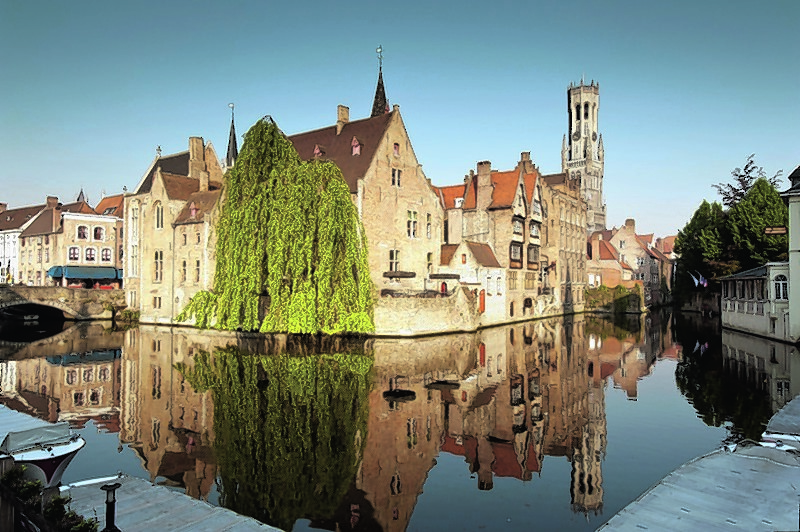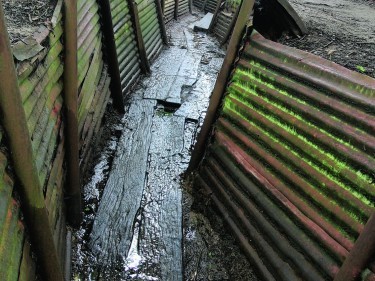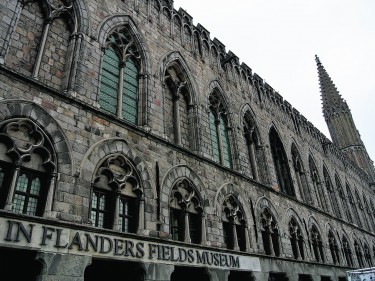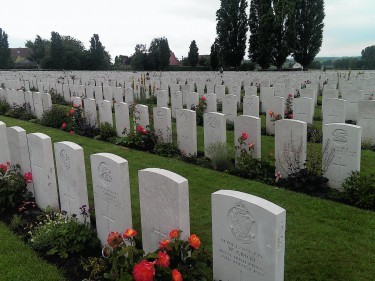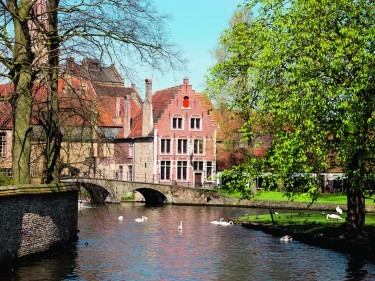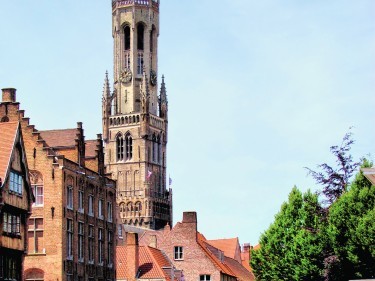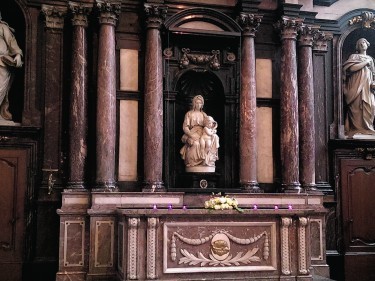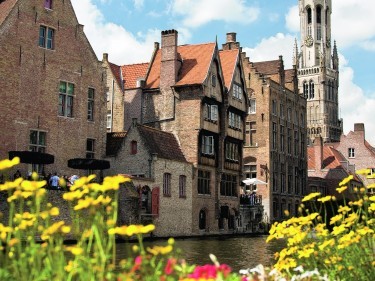Panic took over the moment I stepped inside the dark tunnel. My feet were instantly soaked and although I wanted to run as fast as I could through it, my body was frozen in fear.
The darkness terrified me and yet I was grateful for it protecting me from seeing whatever else was down there.
And while I would have loved nothing more than to just cling to the wall and make my way through it, I was fearful of just a single touch bringing the whole structure down on top of me.
This was my first experience of being in a tunnel in the trenches. It was a chilling experience and I lasted just over a minute before running back the way I came and out into the daylight.
It made me realise that we’ll never be able to comprehend how the young men of the war managed to live in these conditions – with the added fear of being killed.
The trenches we visited were at the Sanctuary Wood Museum and part of a day trip to several sites of importance in and around Ypres, Belgium.
This was the second day of our trip with Diamond Rail Holidays.
We went for the Mediaeval Bruges trip which included exploring the city itself as well as visits to World War I sites.
Next stop on the itinerary was the town of Ypres, which was completely destroyed during WW1. It was argued at the time that it should be left in ruins to serve as a memorial for all the British lives lost there.
The town was later re-built after the locals returned. However, there are still regular reminders of the tragedy that occurred. Only a few weeks before we visited two workmen were killed by an unexploded bomb. Remains of servicemen are still being discovered to this day.
Despite this tragic backdrop, Ypres is a beautiful town and one that serves as a fitting tribute to those who lost their lives. One of its most prominent tributes is The Menin Gate, a large monument with the names of thousands of men who fell during the battles of Ypres and whose bodies were never recovered.
The town is also home to the In Flanders Fields Museum, where we spent most of our visit.
The museum is vast. It is filled with videos, pictures and displays depicting the story of World War I in the West Flanders front region and the aftermath.
In April 1915 after the gas attacks, German soldiers were told to take pictures of the victims, both their own and those of the enemies. These pictures were later bought and sold, with some being made into postcards to be sent home.
The grim images now hang in the museum. Looking at them was distressing.
We ended our day trip with a visit to the Tyne Cot Cemetery, the resting place of more than 11,000 soldiers of the Commonwealth forces. It is quite overwhelming to see all the graves lined up.
Even more saddening was seeing the graves with no names.
The visitor centre offers a good background for understanding the context of this site.
Sitting on the bus back to Bruges I tried to work out how I felt following the day’s activities. It was a very emotional day and one that I am glad I did. It definitely made me appreciate my life and feel gratitude for the sacrifices made.
The WWI trip was the second of our four-day visit and was a very worthwhile and interesting day out, but the city of Bruges itself was the highlight for me. More on that later.
We began our journey with a train ride from Aberdeen to London before meeting up with our tour guide, Marie, and the rest of our group.
Next it was a quick journey on Eurostar before a coach took us to our hotel in Bruges.
Usually my holidays include at least one disaster, either missing our connection or getting on the wrong bus. But those issues are taken care of on a Diamond Rail Holiday tour. Marie was the perfect tour guide.
Known as the Venice of the North, Bruges is a picture-perfect city entwined with cobbled streets and romantic canals. We were staying in the heart of Bruges, an area that has been a Unesco World Heritage site since 2000.
The town is known around the world not only for its gabled houses and majestic churches, but for its intricate laces, exquisite chocolate and fine beer – the two latter products we got to know well.
After checking into our generous room at the Ibis Hotel, we decided for our first night we would try out the hotel restaurant. We were not disappointed.
While I tried some Flemish stew – which was absolutely gorgeous – my boyfriend went for smoked salmon tagliatelle, which again was very impressive.
On the drinks front, I went for a raspberry beer which looked and smelled nothing like any beer I had had before.
The following day we explored the town, first with the help of Marie, and then on our own. Marie showed us the main sights as well as some we would never have found on our own.
Once we had seen the town by foot, we tried a canal cruise. It does offer a very different perspective of the historic town. Buildings we had already explored by foot looked completely different and the town looked even more impressive than it did before.
After the canal cruise it was time for some exploring. That was one of the many great things about our Diamond Rail Holiday experience. While there was help on hand to give us guided tours and day trips, there was a good balance of free time too.
And as fans of the 2008 black comedy In Bruges, featuring Colin Farrell and Brendan Gleeson, we were keen to visit sites that featured in the film.
Anyone who has seen the film will know that the pivotal scene takes place in the bell tower – so that was our first port of call. It stands 83m tall and houses a treasure chamber, an impressive clock mechanism and a carillon with 47 silvertoned bells.
Our reward after climbing the tower’s 366 stairs was a breathtaking and unforgettable panoramic view of Bruges and the surroundings.
Other highlights in the town were Church of Our Lady where you can view Michelangelo’s Madonna and child statue and the Basilica of the Holy Blood, which is home to a relic containing Jesus’s blood.
For something a little bit different we also visited the Minnewater Park and Lover’s Lake which has a lovely story behind it about two star-crossed lovers torn apart by war and waiting years to be reunited. It’s a very picturesque place and lovely for a walk.
On our last day in Bruges we visited one of the many chocolate shops to get a behind-the-scenes look.
It was a bit of an eye-opener into what makes Belgian chocolate a giant in the trade. We tasted some of the product, which was obviously an essential part of the visit.
Full of chocolate and beer, we made our way back to the hotel, collected our luggage – which was also full of chocolate and beer – and boarded the coach which would take us away from this fairytale place and back to reality.
Mediaeval Bruges by Eurostar is priced from £389 and the dates are August 25, October 6 and November 24. The tour starts with a local departure from either Aberdeen, Dundee or Inverness.
The price includes return Eurostar from London St Pancras International to Lille Europe; Coach transfers as described; Three nights’ bed and breakfast in the Ibis Hotel Bruges centre; Walking tour of Bruges; Visit to Ypres, Tyne Cot Cemetery and a Bruges Chocolate Shop; Services of a tour manager from London St Pancras International.
To request a brochure, call 01224 338004 and quote AB582. To view details online, visit www.pressandjournaltravel.co.uk
To check availability or to book, call 0844 409 9537 and quote PJ.
